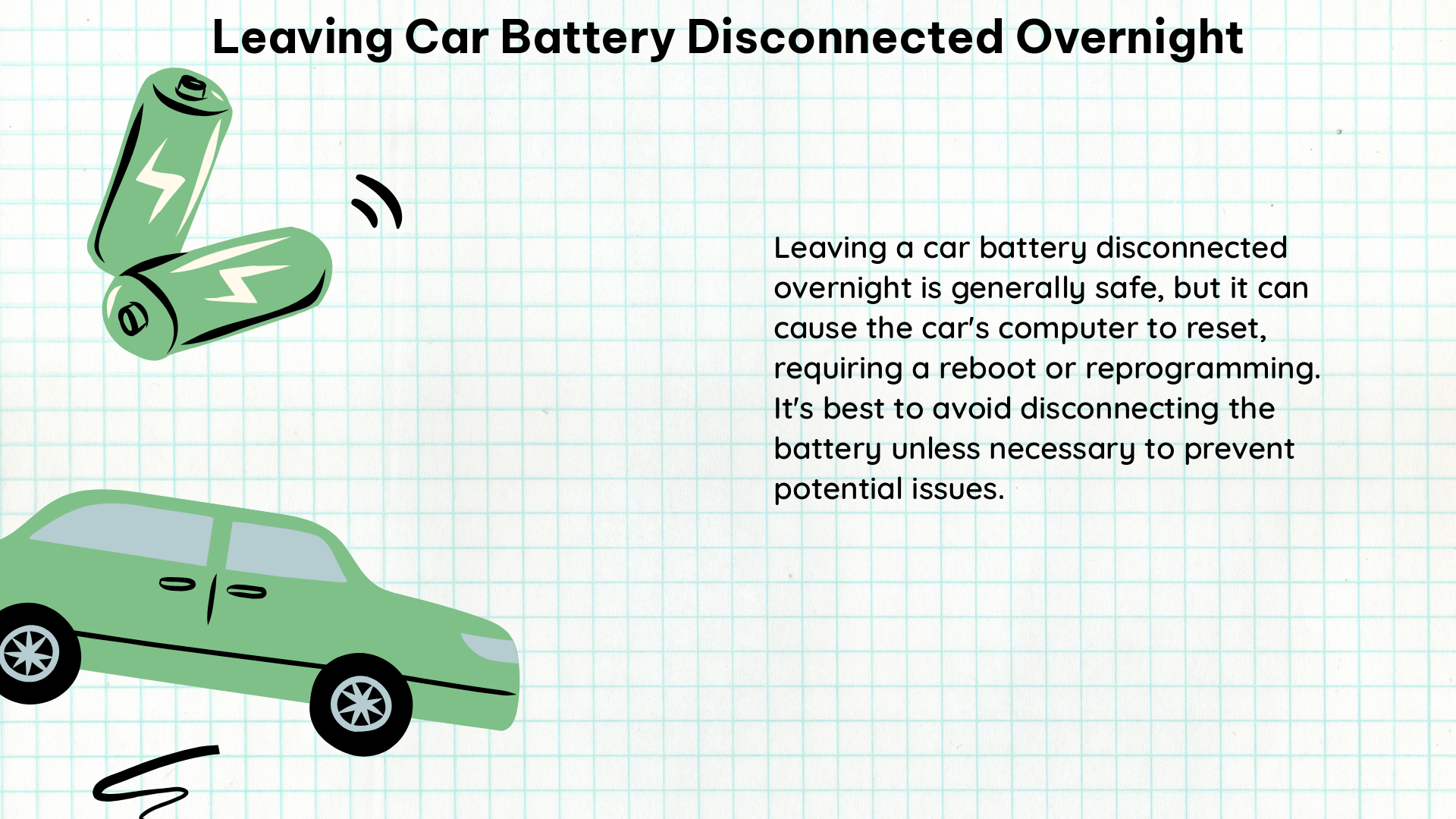Leaving a car battery disconnected overnight can have various effects on the battery’s performance and the vehicle’s electrical system. This comprehensive guide delves into the technical details, providing measurable data points and specifications to help you understand the implications of this practice.
Voltage Drop
When a car battery is fully charged, it typically has a voltage between 12.6V to 12.8V. Disconnecting the battery overnight should not result in any significant voltage degradation. However, the battery’s condition plays a crucial role in its ability to maintain the charge.
- Healthy Battery: A healthy, fully charged 12V car battery should maintain its voltage within the 12.6V to 12.8V range even when disconnected overnight.
- Aging Battery: As a car battery ages, its ability to hold a charge diminishes. A 5-year-old battery, for instance, may be close to the end of its lifespan and could experience a more noticeable voltage drop when disconnected overnight, potentially reaching 12.4V or lower.
Self-Discharge Rate

The self-discharge rate of a disconnected car battery is an essential factor to consider, as it can lead to a gradual voltage drop over time.
- Typical Self-Discharge Rate: A disconnected car battery can self-discharge at a rate of approximately 0.1V to 0.2V per month, depending on factors such as temperature and the battery’s overall condition.
- Extended Disconnection: Leaving a battery disconnected for several months can result in a significant voltage drop due to the cumulative self-discharge effect. For example, a battery disconnected for 6 months could lose 0.6V to 1.2V of its charge.
Parasitic Drain
Parasitic drain occurs when a component in the car’s electrical system continues to draw power even when the vehicle is turned off. This can cause the battery to lose charge over time, even when disconnected.
- Overnight Parasitic Drain: For overnight disconnection, parasitic drain is generally not a significant concern, as the power consumption is typically low.
- Extended Disconnection: However, for longer storage periods, parasitic drain can become an issue and contribute to the battery’s discharge. It is essential to identify and address any parasitic drains in the vehicle’s electrical system.
Computer Memory Loss
Disconnecting the car battery for an extended period can lead to the loss of stored settings in the vehicle’s computer system.
- Short-Term Disconnection: Overnight disconnection is unlikely to cause any issues with the computer’s memory or settings.
- Prolonged Disconnection: For longer storage durations, the car’s computer may lose its programmed settings, which may require reprogramming or relearning when the battery is reconnected. This is more common in newer vehicles with more complex electrical systems.
Temperature Effects
Extreme temperatures, both hot and cold, can have a significant impact on a car battery’s performance and lifespan.
- Cold Climates: In cold climates, removing the battery and storing it indoors at room temperature can help preserve its charge and overall health during long storage periods.
- Hot Climates: High temperatures can accelerate the battery’s self-discharge rate and contribute to its degradation over time.
To mitigate the potential issues associated with leaving a car battery disconnected overnight or for extended periods, it is recommended to use a battery tender or trickle charger. These devices can help maintain the battery’s charge and overall health, ensuring your vehicle is ready to start when you need it.
References:
– Disconnecting Battery to Prevent Drain – Positive Terminal
– Is it Okay to Disconnect My Car’s Battery?
– Battery Removal or Just Disconnect Neg Terminal
– Car Battery Dying Overnight Disconnected
– Repairing Electrical Problems by Draining Storage Voltage

The lambdageeks.com Core SME Team is a group of experienced subject matter experts from diverse scientific and technical fields including Physics, Chemistry, Technology,Electronics & Electrical Engineering, Automotive, Mechanical Engineering. Our team collaborates to create high-quality, well-researched articles on a wide range of science and technology topics for the lambdageeks.com website.
All Our Senior SME are having more than 7 Years of experience in the respective fields . They are either Working Industry Professionals or assocaited With different Universities. Refer Our Authors Page to get to know About our Core SMEs.